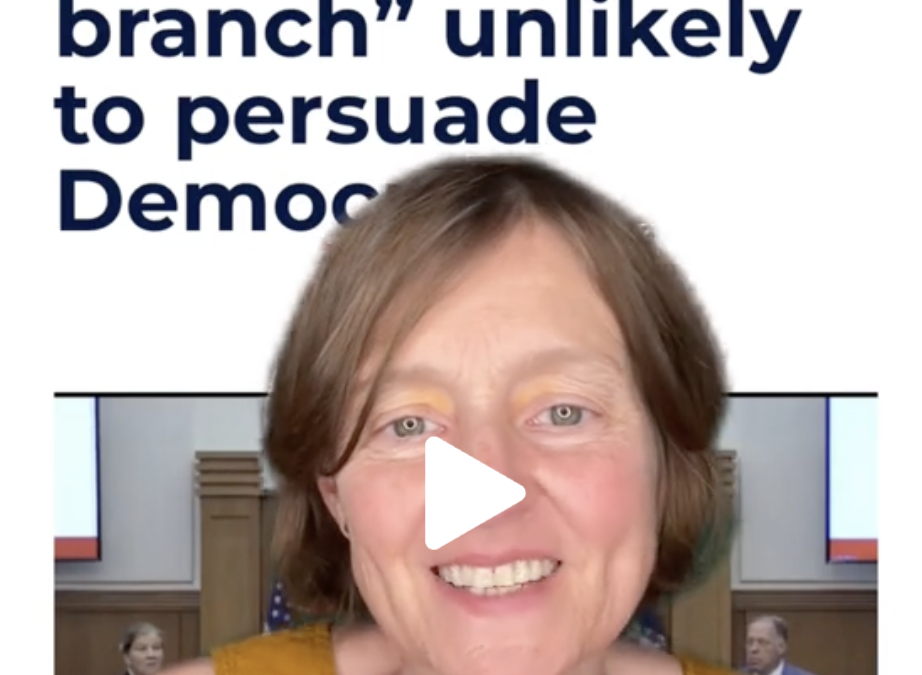
The annual event’s first day examined new laws passed on the state level and local attitudes.
ARLINGTON-In order to fight racism, a community has to admit it exists. That’s been a problem in parts of Virginia, Diane Burkley Alejandro said.
The lead advocate of People Power Fairfax told people at Tuesday’s Immigrant Advocates Summit that even progressive jurisdictions like Fairfax deny the presence of racism in their community.
“We tend to get pushback,” Alejandro said. “They’ll say ‘that doesn’t happen here’ or ‘it’s just a few bad apples.’”
However, regular people can leverage the Freedom of Information Act to prove them wrong.
In Fairfax, People Power accessed arrest data using FOIA. They found that Black residents were much more likely to be arrested than white ones in the area. The disparity was even more striking after statistics for the Latino population were disaggregated. Latinos comprised 28% of white people arrested in Fairfax, Alejandro said. If you removed them from the equation, Black people went from being 3.8 times more likely to face arrest than white people to seven times more likely.
The organization also gathered data on disparities in disciplinary action. A police officer received discipline 45% of the time when people reported improper use of a police vehicle. When people report improper use of force, however, disciplinary action only happens in 2% of cases.
“This is terrible for the credibility of the police,” Alejandro said, “but more importantly for the people who are subject to this.”
Virginia’s failure to take care of its foreign-born population was a recurring theme during Tuesday’s immigrant summit. In day one of the event, organized by the Virginia Coalition of Latino Organizers, more than 100 people tuned in via Facebook Live and Zoom to take part. The main focus involved providing ordinary people with actionable steps to advocate for immigrants in their own communities.
Taking Action Locally
Progress on the immigrants’ rights front is going slow in the General Assembly. It’s not likely this will change in 2021, advocates said, as Republicans are trying to limit the upcoming session to only 30 days. Also, concerned about the pandemic, Virginia Speaker Eileen Filler-Corn will hold House sessions remotely. This limits advocates’ ability to lobby and interact with legislators. Just like during the special session, meanwhile, the Senate will conduct their business in person.
But while legislative solutions may take time, the immigrant summit offered strategies to help communities become anti-racist. After all, racial justice and immigration go hand in hand, Sean Perryman pointed out.
“There are Black immigrants. It’s important that we remember that,” he said.
Perryman, the current president of the Fairfax County NAACP and one of several candidates for lieutenant governor in 2021, said his father immigrated from Barbados.
As for what people can do to help immigrants? Summit members mentioned citizen review boards multiple times as one of the options. These boards can “receive, investigate and issue findings on complaints” involving police or police department employees. Previously, they had just been advisory boards, making simple recommendations. But this fall, the General Assembly changed all that.
Under the new rules that take effect next July, review boards will be able to investigate complaints and then decide guilt or innocence. If the officer is guilty, the board then will determine punishment in coordination with the local police chief. This could be a letter of reprimand, suspension without pay, demotion within the department or reassignment. They also can legally fire officers if the board decides it’s necessary.
The only catch is that local residents have to request a review board be created. It’s completely up to local city councils and county boards if that takes place.
‘Inserting a Culture of Transparency’
Also on Tuesday, ACLU Virginia Executive Director Claire Gastañaga talked about some of the changes made by the General Assembly in this year’s special session. The Assembly restricted the use of chokeholds. Police also can no longer stop someone for “pretextual” reasons.
“Police often do things…like stop you for something hanging off your mirror, smoking with a child in the car, or you have a headlight out,” Gastañaga explained.
On the other hand, the General Assembly failed to ban the use of military weapons by local law enforcement. They also did not ban tear gas, even though the body convened its special session this summer at the peak of the Black Lives Matter protests. During these protests, police often gassed citizen participants. Perryman argued that instead of tangible progress, immigrant advocates saw “watered-down versions of necessary reforms and half-measures.”
Perryman said what advocates want “is not a war on the police, but inserting a culture of transparency and accountability.”
Local police departments need oversight and advocates also want to limit contact between law enforcement and the immigrant community. They’ve seen how local police forces can be weaponized against undocumented people.
Luis Aguilar from CASA Virginia described his operation’s main policy thrust as a “trust policy.” The goal, he said, is to detangle any cooperation between local law enforcement and ICE. Such cooperation “undermines trust,” and stops undocumented people from accessing services, including the police.
Overcoming Bureaucratic Hurdles
One common thread in this year’s immigrant summit was how burdensome the processes can be for undocumented residents. In the case of licenses especially, decisions about whether to even make the attempt to get one are fraught with anxiety and potentially huge consequences, including deportation.
A law that allows undocumented Virginians to receive “driver’s privileges cards” (DPCs) will take effect Jan. 1, 2021. For some, especially those forced to put themselves at risk of law enforcement intervention each day by simply driving to work without a license, this is a victory.
However, the number one question that Simon Sandoval-Moshenberg receives about the new policy is, “Will ICE have access to my address?” Sandoval-Moshenberg is the legal director of the immigrant advocacy program at the Legal Aid Justice Center.
If immigrant advocates had achieved their “dream bill” in last year’s session of the General Assembly, he said, in January he’d be advising folks to “Go for it!” and apply for a DPC right away. Unfortunately, many more protections are needed for applicants’ personal privacy.
The DMV will not retain passport information that undocumented folks use to prove who they are. However, addresses will be retained. Sandoval-Moshenberg said ICE’s “biggest use of driver’s license data ” is to locate people who are already on a “target list” to be deported.
Beyond that, undocumented folks will face myriad barriers to successfully applying for a DPC, he said. It’s difficult to find appointments at overburdened DMV offices right now due to the pandemic. Most written materials explaining the process to applicants are produced in only two languages: English and Spanish, far from the full range of languages spoken by immigrants. And folks must reapply in-person for the DPCs every two years, as well as pay a $50 fee.
Immigrants Face Other Barriers
Accessing crucial rent assistance will be similarly cumbersome, said Jase Hatcher of the Virginia Interfaith Center for Public Policy. The budget resulting from this year’s special session provides an opportunity for landlords to apply for rent assistance on behalf of their tenants. Tenants can also apply individually.
However, the budget also allows for eviction if the tenant can’t reach a payment plan agreement within two weeks. The problem is that rent assistance could take up to 45 days to process. Immigrants face language barriers when filing out the form, Hatcher said, as well as barriers to accessing the needed documentation and the technology to submit an application.
Without that extra money, some immigrants right now don’t have the income to buy groceries, let alone pay rent.
Advocates will return later today for the second part of this year’s immigrant summit. The focus will turn to federal operations and what’s working, as well as what’s not.
Ashley Spinks Dugan is a freelance reporter for Dogwood. You can reach her at [email protected].
Politics

Virginia NAACP to sue Youngkin over handling of DEI records requests
The civil rights group said it would take Youngkin to court for not releasing communications between his office and state universities related to...

VIDEO: After vetoes, Youngkin’s budget “olive branch unlikely to persuade Democrats
Can the Democrats in the General Assembly and Republican Gov. Glenn Youngkin really find "common ground" among his proposed state budget amendments?...
Local News

Virginia verses: Celebrating 5 poetic icons for National Poetry Month
There’s no shortage of great writers when it comes to our commonwealth. From the haunting verses of Edgar Allan Poe, who found solace in Richmond's...

Join the fun: Recapping Family Literacy Night’s storybook adventures
When’s the last time you read a book aloud with a loved one? If it’s difficult to answer that question, then maybe it’s time to dust off that TBR...




